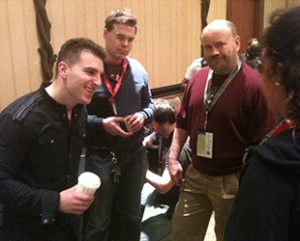Jessi Hemle of Fortune led a discussion with Brian Chesky, co-founder of Airbnb on Sunday at the Hilton. Chesky began by sharing the story of Airbnb’s genesis.
The idea began out of necessity – Chesky was short on rent after just moving to San Francisco, so he and a friend rented out three air matresses when they discovered that hotels were booked for a popular conference in town.
The idea for Airbnb was born, but it was slow to take. A lot of people – investors included – thought the idea was insane. One friend commented, “Brian, I hope that’s not the only thing you’re working on.”
But the team of co-founders, which consists of two designers and one engineer, pressed on. “I thought, I can’t be so unusual that I enjoy this and no one else in the world would want to use this,” Chesky said.
Many startups start fast and then slow down, but Airbnb experienced the opposite. They actually launched the company several different times, because, Chesky joked, “If you launch and no one notices, you can launch again.”
Today Airbnb’s success is well-known. Tonight at SXSW, nearly 8,000 will be staying at private homes through Airbnb. Just two years ago there were only 2,000. The service sees around 50-60,000 people per night around the world, and in a typical night people are staying in Airbnb homes across 170 countries.
The “cereal” entrepreneur
To build the company, the team had taken on a lot of debt. To raise some capital, the idea for Obama O’s was born. This “cereal of change” sold for nearly $40 a box and helped the team raise some funding. This creative endeavor also helped land them a place in Y Combinator.
Chesky also reflected on the challenges in building the company. Having designer co-founders was not seen as a good thing in 2008 when the Airbnb team approached angels. One potential investor left a pitch meeting mid-smoothie without a word.
“If you look like something they’ve never seen before, that’s not a recipe for success,” Chesky remarked. “Investors are looking for success patterns.”
But Chesky cautioned against this approach, saying that we shouldn’t focus on what’s timely over of what’s timeless.
Misteps and re-directs
Hemle asked Chesky to elaborate on some of his earliest mis-steps and how he recovered from them.
After Y Combinator, Airbnb began to grow and they were given advice to target property groups instead of ordinary people. “It went against my intuition,” Chesky recalled. But they spent six months building out for property groups, only to drop the idea in the end.
Chesky had gone to London, stayed with a rental property group on Airbnb and had a bad experience. Then he stayed in Paris with a woman at her home, and had an amazing, memorable experience. “That is the soul of Airbnb,” Chesky said. “Airbnb is in the business of creating memories.”
Scaling the business
Chesky discussed the importance of a solid foundation for startups. “It’s all about love, growth, and foundation.” You build a company that employees love, and they’ll make a product customers love. When customers love it, investors should too.
Airbnb focused on their first 100 users to make sure they loved the product. “It’s better to have 100 people who love you than 1,000 who kind of like you.” They went door to door in New York City offering to take professional photos of homes for the site and staying with users.
Meeting needs
Chesky touched on the need to not get detached from your user base. In June 2010, he effectively became homeless, moving out of his apartment and living in different Airbnb homes instead. He thinks it’s the best way to “keep a pulse” on the customer base.
During Q & A, Chesky shared his definition of design: human, empathy-driven problem solving. He said Airbnb goes beyond making something people want – making something they need. Many people need the money they bring in through the service to pay their own rent. The company meets needs in other ways too.
“Users wanted to rent their homes for free after Hurrican Sandy,” Chesky recalled. The team built in a free option in their online form, and hundreds of people opened their homes through Airbnb to refugees.
The sharing economy
The sharing economy is a popular buzz word right now. Chesky observed that this people-powered economy isn’t just a “web thing.”
“Now, everyone has a voice,” said Chesky. “People (are) creating content and now providing services.”
The share economy has provided opportunities to better utilize resources. Chesky gave the example of an electric drill. In the life of a drill, it’s only used for a combined 13 minutes.
But Chesky remarked, “The stuff that matters in life isn’t stuff in the first place, its experiences. Your time is your biggest asset.”
To hear Chesky answer audience questions about pitching to the media, “dogbnb” and operating in different countries, check out this video:

